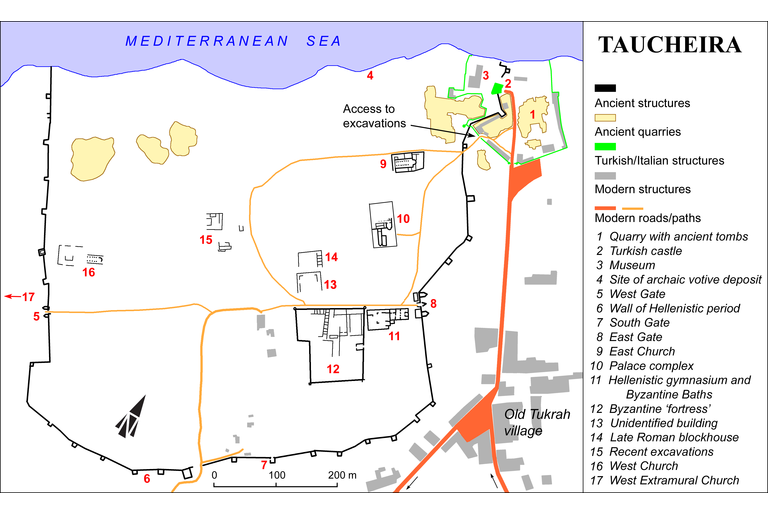Name of a Rhodian
IGCyr001920
Trismegistos ID: 738118
Source Description
Support
Krater dated 500/450 B.C., Laconian ware (estimated diameter 0.4).
Layout
Scratched on the lip (width 0.105).
Letters
0.023; alpha with oblique bar ending at bottom of right stroke, beta with very flat loops, open eta for short e, dissymmetrical nu, trident-shaped chi (see commentary).
Place of Origin
Date
Between 500 and 450 B.C. (context, lettering)
Findspot
Found between 1963 and 1965 at Taucheira pleiades; HGL : archaic votive deposit .
Present Location
Not seen by IGCyr team.
Text constituted from
Transcription from editors (HB).
Bibliography
Boardman-Hayes, 1966 Boardman, J., Hayes, J., 1966, Excavations at Tocra 1963-1965. The archaic deposits I, British School of Archaeology at AthensSuppl. 4, London - see in bibliography , n. 976 (ph. dr.); Dobias-Lalou, 1970 Dobias-Lalou, C., 1970, Pour une chronologie des inscriptions archaïques de Cyrène, Revue de Philologie, de Littérature et d'Histoire Anciennes (RPh)ser. 3, 44, 228-256 - see in bibliography , pp. 252-253, number 1; Marengo, 2010 Marengo, S.M.2010, Segni e graffiti greci. Proposte di lettura, in S. Antolini, A. Arnaldi, E. Lanzilotta, Giornata di Studi per Lidio Gasperini, 5 giugno 2008, Roma, 13-27 - see in bibliography , pp. 20-23, whence SEG Supplementum Epigraphicum Graecum, Leiden, then Amsterdam, 1923-1971, then 1979- - see in bibliography , 60.1848. Cf. Dobias-Lalou, 2015 Dobias-Lalou, C., 2015, Les débuts de l'écriture en Cyrénaïque, in A. Inglese, Epigrammata 3. Saper scrivere nel Mediterraneo antico. Esiti di scrittura fra VI e IV sec. a.C., in ricordo di Mario Luni. Atti del convegno di Roma, 7-8 Novembre 2014, Tivoli, 59-80, 315-321 - see in bibliography , pp. 69-70; Antonini, 2016 Antonini, R., 2016, Sulla dedica arcaica ai Dioscuri da Cirene, in V. Purcaro, O. Mei (eds.), Cirene greca e romana II, Monografie di archeologia libica, 44, Cirene Atene d'Africa9, 27-64 - see in bibliography , pp. 45-46 and Dobias-Lalou, Bulletin Épigraphique Dobias-Lalou, C.Bulletin Épigraphique in Études Grecques (REG)1987- - see in bibliography 2017.638; Marengo, 2016 Marengo, S.M., 2016, Scoperte epigrafiche a Cirene, in Rizzo, M.A., Macerata e l'archeologia in Libia. 45 anni di ricerche dell'Ateneo maceratese. Atti del Convegno Macerata, 18 marzo 2014, Monografie di archeologia libica40, Roma, 161-170 - see in bibliography , pp. 165-166.
Apparatus
1 Marengo, 2010 Marengo, S.M.2010, Segni e graffiti greci. Proposte di lettura, in S. Antolini, A. Arnaldi, E. Lanzilotta, Giornata di Studi per Lidio Gasperini, 5 giugno 2008, Roma, 13-27 - see in bibliography Ἀρχένβρ̣[οτ] [c. 1 - 2] : Boardman-Hayes, 1966 Boardman, J., Hayes, J., 1966, Excavations at Tocra 1963-1965. The archaic deposits I, British School of Archaeology at AthensSuppl. 4, London - see in bibliography ΑΡΧΗΝΒΑ̣ : Boardman-Hayes, 1966 Boardman, J., Hayes, J., 1966, Excavations at Tocra 1963-1965. The archaic deposits I, British School of Archaeology at AthensSuppl. 4, London - see in bibliography ΑΡΨΗΝΒΑ̣ : Boardman-Hayes, 1966 Boardman, J., Hayes, J., 1966, Excavations at Tocra 1963-1965. The archaic deposits I, British School of Archaeology at AthensSuppl. 4, London - see in bibliography Αρχην Βα̣[καλ?] (Anna Morpurgo Davies' suggestion) : Dobias-Lalou, 1970 Dobias-Lalou, C., 1970, Pour une chronologie des inscriptions archaïques de Cyrène, Revue de Philologie, de Littérature et d'Histoire Anciennes (RPh)ser. 3, 44, 228-256 - see in bibliography ΑΡΧΗΝΒ
French translation
Arkhembr[otos---] .
English translation
Archembr[otos---] .
Italian translation
Archembr[otos---] .
Commentary
For this graffito, no convincing explanation was given before S.M. Marengo's one: she rightly pointed out that it could be read only with the trident-shape letter as a chi and eta as a short e, both attested in the archaic lettering of Rhodes, the more so that such a reading produces a typical Rhodian name. The use of nu instead of mu before beta is a hypercorrect feature, as well as the use of eta instead of epsilon.
It cannot be decided whether the graffito was cut in Rhodes and brought to Cyrenaica or cut in Cyrenaica by a Rhodian traveller. In both cases, the vase, a Laconian ware, had travelled more or less through the Mediterranean sea ( contra Antonini, 2016 Antonini, R., 2016, Sulla dedica arcaica ai Dioscuri da Cirene, in V. Purcaro, O. Mei (eds.), Cirene greca e romana II, Monografie di archeologia libica, 44, Cirene Atene d'Africa9, 27-64 - see in bibliography ). As to the script, the present use of trident-shaped chi in a Rhodian context should be compared with two other examples found at Cyrene: in IGCyr110100 the rest of the lettering is purely Cyrenaean, whereas IGCyr000430 is too fragmentary to allow any classification.
The name, when complete, might have been at the genitive case for an owner's mark or at the nominative for a dedicant's name, so that the exact text-type escapes us.
Creative Commons Attributions-NonCommercial 4.0 International License.
All citation, reuse or distribution of this work must contain a link back to DOI: http://doi.org/10.6092/UNIBO/IGCYRGVCYR and the filename (IGCyr000000 or GVCyr000), as well as the year of consultation.
